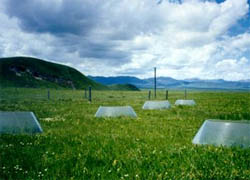
A collaborative study by researchers from the CAS Northwest Institute of Plateau Biology and University of California, Berkeley, provides experimental evidence that climate warming could cause dramatic and rapid declines in plant species diversity in high elevation ecosystems. Their work has been published in the Dec. Issue of
Ecology Letters, an international journal on ecology.
Over the past five years, the Chinese and U. S. scientists have conducted studies on the impact of global change and land utilization on alpine meadow ecosystem. They investigated the independent and combined effects of experimental warming and grazing on plant species diversity on the north-eastern Tibetan Plateau, a region highly vulnerable to ongoing climate and land use changes. Their experiments show that climate warming caused a 26-36% decrease in species richness, a response that was generally dampened by experimental grazing. Higher species losses occurred at the drier sites where ntrogen was less available. Moreover, the researchers observed an indirect effect of climate change on species richness as mediated by plant plant interactions. Heat stress and warming-induced litter accumulation are potential explanations for the species' responses to experimental warming. This is the first reported experimental evidence that climate warming could cause dramatic declines in plant species diversity in high elevation ecosystems over short time frames and supports model predictions of species losses with anthropogenic climate change.







